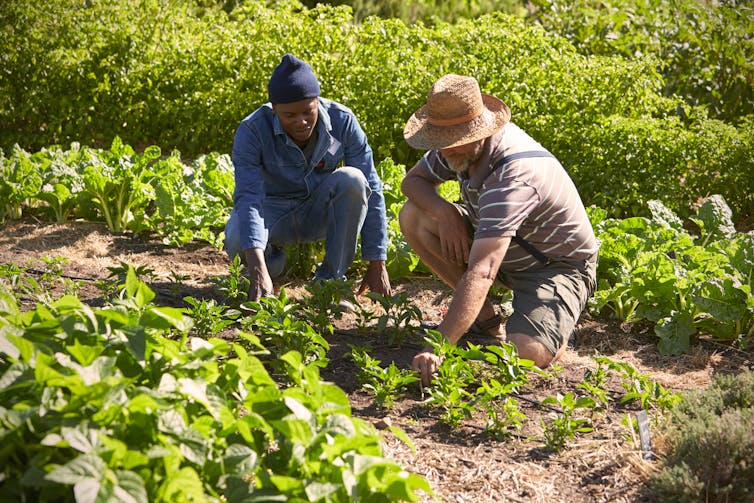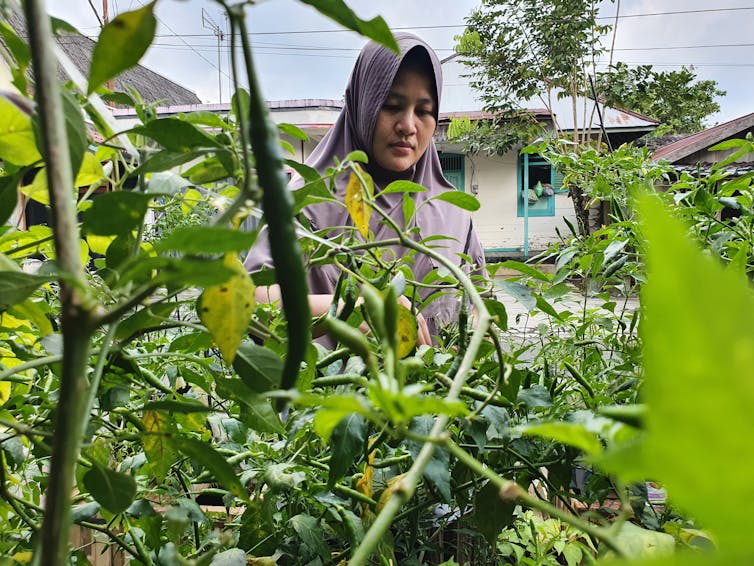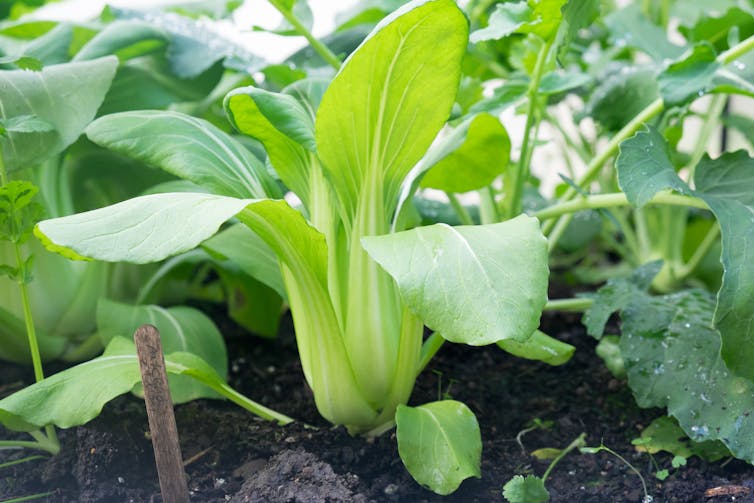3 ways community gardens often exclude migrants and refugees — and how to turn this around
- Written by Bethaney Turner, Associate Professor, Centre for Creative and Cultural Research, Faculty of Arts and Design, University of Canberra
With millions of Australians enduring lockdown yet again, you may be seeking solace in gardening. For migrants and refugees in Australia, gardening can be particularly meaningful when shared in community spaces.
But community gardens aren’t always sites of inclusion. In our recently published research[1], my colleagues and I highlight the ways migrants and refugees are excluded from community gardens — and how to change this.
When community gardens are socially inclusive, everyone benefits. Culturally diverse community gardens can not only deepen cross-cultural social connections[2], they can even help develop the skills to adapt to change and crisis, such as from climate change.
The benefits of community gardens
Waiting lists to join community gardens are extremely long in many parts of Australia, with some gardens[3] requiring up to an eight-year wait. Advocacy groups[4] consistently call for more sites and greater financial support to meet this demand.
There are good reasons for their growing popularity. Improved mental and physical health and wellbeing[5] regularly tops the list of their positive impacts, as they promote[6] more exercise, greater access to nutritious food, strengthen community connections, and more.
Read more: Green for wellbeing – science tells us how to design urban spaces that heal us[7]
The food grown in community gardens can also help improve food security. During lockdown, these sites have been vital[8] to meet the everyday needs of many suffering from financial hardship.
For refugees and migrants, communal gardening sites can be therapeutic, safe spaces.
When immersed in supportive communities[9] that share a commitment to productive gardening, migrants and refugees can improve their self-efficacy. The ability to grow culturally familiar foods[10] can also maintain their connections to homelands[11], easing the resettlement and migration process.
 Communal gardens should be safe spaces.
Shutterstock
Communal gardens should be safe spaces.
Shutterstock
This is why it’s so important to improve these opportunities and remove any barriers excluding these gardeners. Our research[12] reviewed worldwide studies of community gardens, and found common barriers to refugee and migrant participation revolve around three key areas:
1. Physical and material features of gardens
This includes high membership fees, inability to easily travel to gardens and insecure land tenure.
Site design that limits gardeners’ autonomy and ability to grow familiar foods is also a problem. This can happen where there’s communal, rather than individual, plot cultivation, putting pressure on new gardeners to grow foods already well known to existing gardeners.
Another barrier is a lack of available space and small plot sizes[13], which can make it harder to grow culturally important crops, such as maize.
2. Garden management styles
Inclusive practices are often not embedded into information sharing and decision making, such as not translating information.
For example, community gardens often rely on formal management meetings, but these may not take into account different languages[14], cultural traditions and unequal power relations.
Relying on community gardens for food security can also be a big problem for refugees and migrants, especially for new arrivals. This can lead to gardens replacing more holistic social support programs[15].
Read more: Running out of things to do in isolation? Get back in the garden with these ideas from 4 experts[16]
3. Privileging particular values and aesthetics
The way we care for gardens and ideas about how a productive garden should look, are often shaped by whatever cultural norm[17] is dominant. Uniform, neatly mulched raised beds, free of weeds and overhanging vegetation, are often favoured by risk averse councils.
Migrant and refugee gardening styles can be at odds with accepted expectations and values like these. Many are used to cultivating directly into the soil and prefer to grow a wide variety of plants together that may not look neat, but can increase biodiversity[18]. They may also leave more space between crops to improve yield.
This means these familiar, productive and culturally appropriate[19] ways of gardening for refugees and migrants can be devalued and excluded, along with their skills and knowledge.
 Volunteer groups managing community gardens should be give more resources.
Shutterstock
Volunteer groups managing community gardens should be give more resources.
Shutterstock
The good news is we can make community gardens more socially inclusive places. To do this, there needs to be more investment from governments and local councils in resources (including land and financial support) for the largely volunteer groups developing and managing these sites.
These resources need to assist migrants and refugees to:
develop social and ecological connections that engender a sense of belonging
contribute to the design and management of gardens in culturally and linguistically inclusive ways
make choices about how to tend their plots that enable some connection to their homeland
engage with other garden members from all backgrounds to share knowledge and lessons
not have to rely on the garden as a primary source of food or income generation.
Gardens are better when migrants and refugees are included
Community gardens are currently off limits[20] to many under lockdown. When we return to COVID-normal, the lessons from socially inclusive gardens could help communities better prepare for future disruption, particularly from climate change.
Read more: From veggie gardening to op-shopping, migrants are the quiet environmentalists[21]
Resettlement in a different country involves ongoing adjustments to new social, ecological and climate conditions. We can all learn from migrant and refugee skills, knowledge, and the ways they adapt[22], as adjustment to unfamiliar environments often comes with careful tinkering[23] and trial and error[24].
When it comes to food gardens, past research has shown this experimentation can lead to boosting biodiversity[25] and expanding diets, due to the variety of crops grown. One example is the introduction of maize to produce maize flour in many gardens throughout Australia. This is a diet staple for many African nations[26].
 The desire to grow foods from the homeland can lead to gardening techniques that can sustain future changes in climate.
Shutterstock
The desire to grow foods from the homeland can lead to gardening techniques that can sustain future changes in climate.
Shutterstock
The desire to grow culturally relevant foods means tinkering with soil and growing conditions, as well as the plants themselves. This enables the plants to adapt to unfamiliar conditions, which will become increasingly variable under climate change[27]. Learning how to grow tropical plants in frosty parts of Victoria[28] or on marginal soils[29] are a couple of good examples.
What’s more, gardeners from diverse backgrounds can increase a community’s repertoire of safe, low-tech cultivation and pest management techniques. This includes how to make the most of the waste from culturally familiar foods, such as Japanese gardeners’ use of tofu residue[30] as a soil conditioner.
Not only will bringing together culturally diverse community members foster more meaningful connections, but also it will strengthen our shared ability to adapt to the uncertainty of a changing climate.
The author would like to acknowledge Jessica Abramovic and Cathy Hope who helped compile the research upon which this article is based.
References
- ^ published research (link.springer.com)
- ^ social connections (www.tandfonline.com)
- ^ some gardens (rushallgarden.wordpress.com)
- ^ Advocacy groups (www.communitygarden.org.au)
- ^ health and wellbeing (www.mdpi.com)
- ^ as they promote (academic.oup.com)
- ^ Green for wellbeing – science tells us how to design urban spaces that heal us (theconversation.com)
- ^ been vital (www.abc.net.au)
- ^ supportive communities (www.apa.org)
- ^ culturally familiar foods (onlinelibrary.wiley.com)
- ^ connections to homelands (www.abc.net.au)
- ^ Our research (link.springer.com)
- ^ space and small plot sizes (www.ugain.online)
- ^ languages (sustain.ubc.ca)
- ^ social support programs (www.theage.com.au)
- ^ Running out of things to do in isolation? Get back in the garden with these ideas from 4 experts (theconversation.com)
- ^ cultural norm (onlinelibrary.wiley.com)
- ^ increase biodiversity (www.cambridge.org)
- ^ culturally appropriate (books.google.com.au)
- ^ off limits (www.melbourne.vic.gov.au)
- ^ From veggie gardening to op-shopping, migrants are the quiet environmentalists (theconversation.com)
- ^ the ways they adapt (theconversation.com)
- ^ tinkering (journal.ep.liu.se)
- ^ trial and error (www.tandfonline.com)
- ^ biodiversity (www.tandfonline.com)
- ^ African nations (www.abc.net.au)
- ^ under climate change (www.sciencedirect.com)
- ^ frosty parts of Victoria (www.sciencedirect.com)
- ^ marginal soils (www.tandfonline.com)
- ^ Japanese gardeners’ use of tofu residue (open.library.ubc.ca)

















